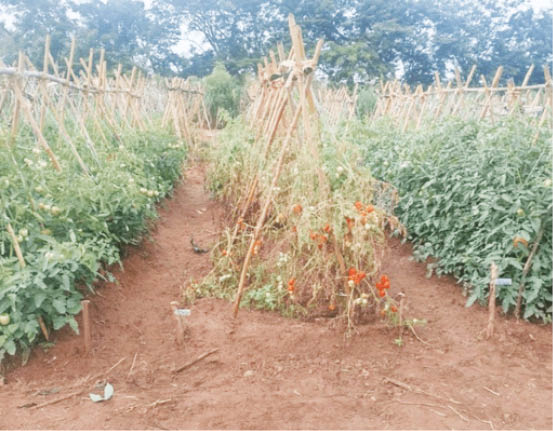Tomato is the most popular vegetable in West Africa. And more could be produced, if only we could overcome limitations, such as those of pests and diseases, heat stress, and post-harvest losses.
A particularly devastating problem is a tomato disease called bacterial wilt. In Benin, for example, bacterial wilt has caused tomato growers in many areas such as the Ouémé valley, to abandon tomato production completely. Something had to be done, but unfortunately, there are no effective phytosanitary control measures against this soil-borne disease, caused by the pathogen Ralstonia solanacearum. The development, testing and promotion of resistant varieties is considered to be the most efficient and environmentally friendly option.
To meet this need, WorldVeg and its partners the Institut National des Recherches Agricoles du Benin (INRAB) and the Direction de la Production Végétale (DPV) of the Ministry of Agriculture introduced 15 improved tomato varieties in Abomey-Calavi and Malanville. Evaluation was undertaken jointly with farmers and seed producers.
Varieties were identified that had much improved resistance to bacterial wilt, and market-preferred traits such as high fruit firmness, longer shelf life, and a deep red color. Several bacterial wilt-resistant varieties even had a 100 percent survival rate, while all the plants of susceptible varieties died. These newly selected bacterial wilt-resistant lines raise the hope of resuming tomato production once again in areas where farmers had forsaken production, and also as part of wider efforts towards improving the safe and sustainable production of tomatoes in the whole of West Africa.
- Railway authority moves to recover illegally occupied properties nationwide
- Police arrest 7 kidnappers, recover firearms
Selected varieties are now undergoing registration in the national catalog to make their seeds available and accessible to farmers. Variety registration is a prerequisite for the production and marketing of certified seed by local seed enterprises.
The anticipated impacts of the dissemination and adoption of the bacterial wilt-resistant varieties include improved tomato yields, expansion of tomato production areas, increased farmer incomes, and increased availability of tomatoes for all.
These positive outcomes have resulted from the ‘Safe locally-produced vegetables for West Africa’s consumers’ (SAFEVEG) project, funded by the European Union and the Ministry of Foreign Affairs of the Netherlands. The project addresses demand and supply constraints in the vegetable sector in West Africa, and the activities and results reported here form part of the component that is identifying, introducing and promoting climate-resilient and disease resistant vegetable varieties and strengthening local seed systems.
Source: AFSTA/World Vegetable Centre

 Join Daily Trust WhatsApp Community For Quick Access To News and Happenings Around You.
Join Daily Trust WhatsApp Community For Quick Access To News and Happenings Around You.


